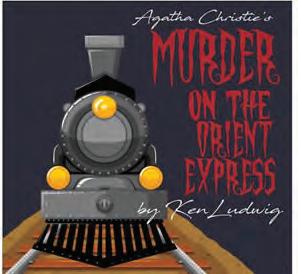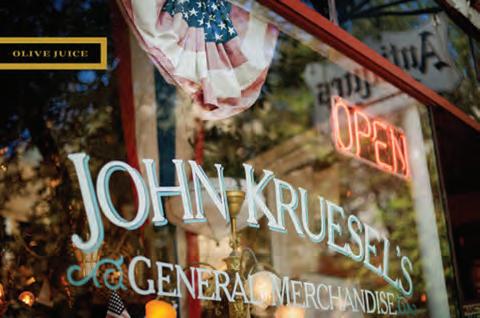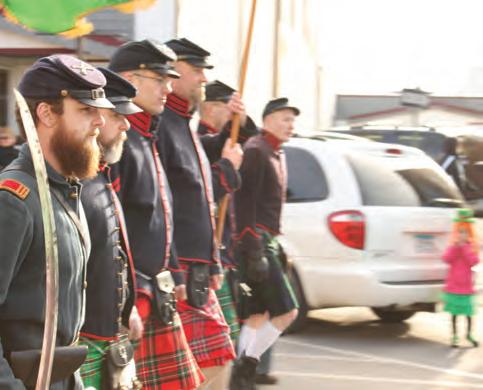THE BOOKWORM SEZ By Terri Schlichenmeyer
If You Lived Here You’d Be Home by Now by Christopher Ingraham Moving stinks. You pack your stuff in boxes and old newspaper, then you haul it to the next place, and spend a year opening boxes and putting things away. If you’re smart, you keep the boxes because, statistically, you’ll move again soon; if you’re lucky, as in the “If You Lived Here You’d Be Home by Now” by Christopher Ingraham, you’ll love where you land. In his job as a data reporter for the Washington Post, Christopher Ingraham mined the
internet for statistics, then he wrote columns about what he found. It was fun work that allowed him to play with words in his Washington D.C. office, so when he discovered a livability ranking for each of the thousands of counties around the country, he poked a little fun at Red Lake County, Minnesota, way up in the states’ northwest corner. The list placed Red Lake County dead last. Column done, column posted, and fun poked, it wasn’t ten minutes before Ingraham’s inbox was flooded with protest. Red Lake County citizens were Minnesota-nicely upset; Minnesotans as a whole were aghast that he would say something callous without a visit. And so, Ingraham checked with his bosses, booked a plane to nearby South Dakota, rented a car,
Medieval Bodies: Life and Death
in the Middle Ages by Jack Hartnell
Your poor old bones have just about had it. Every day brings another ache. Every sun’s ray and snowflake feels like an assault. You ain’t getting any younger and your poor old bones know that well. What’s worse, as you’ll see in the new book “Medieval Bodies” by Jack Hartnell, your poor old ancestor’s poor old bones might have had it better than yours. Think of what it must’ve been like to live during Medieval times, and you might very well wrinkle your nose. Weren’t Medieval people
uneducated, dirty, stinky louts with bad teeth and body odor? You might believe that. And you’d be wrong. Says Hartnell, there are really three parts to the Medieval Ages: It started at the end of the Roman Empire, and then it split into Byzantium, “western and central Europe,” and into the Arabian Desert with the Muslims. Though each of these highly-different cultures saw things dissimilarly, they all knew a surprising lot about how the human body works. They had a basic concept of the dangers of bad bacteria, for instance, and a rudimentary idea of how food was digested and injuries could be healed. They knew that the brain was the holder of memory and thought and they were aware of nerves in the head. Because sugar was dear and vegetables cheap, they
The Wonders: The Extraordinary Performers Who Transformed the Victorian Age
by John Woolf Mirrors never lie. They show in great detail every wrinkle and blemish and stray hair. You can clearly spot a smudge. Every pound is on display, every ill-fitting garment there for your notice. You can peer into a mirror and see how you really look – and in the new book “The Wonders” by John Woolf, there may be more than meets the eye. General Tom Thumb could not have been more charming.
Twenty-four-year-old Queen Victoria was quite taken with him; at 25 inches in height, the General was not much smaller than Victoria herself, who measured less than five feet tall. No, Thumb was a witty “’man in miniature’” and she liked him instantly, enough that she made him a “pet” of the court and a sensation, world-wide. It was 1844 and Thumb was the latest in a short line of well-known “freaks,” as dwarfs and their brethren were called by Victorian-era handlers and gawkers (more on this later). Dwarfs had been known at courts for centuries – 18-inch-tall Jeffrey Hudson was a steady, pampered companion to Queen Henrietta Maria in the mid-1600s – yet most weren’t so lucky: they lived at the
You Never Forget Your First: A Biography of George Washington by Alexis Coe Absolutely, yes, you’ll vote this year. Maybe your mind’s not fully made up, maybe it is; either way, you’ll cast your ballot if they have to carry you in on a stretcher to do it. Taking part in the process is a right you’re proud to have, so you never miss an election but no matter how many you participate in, says Alexis Coe, “You Never Forget Your First.” Some time after she began writing this book, Coe
noticed one thing: all the biographies about George Washington were “authored by men.” Everything most of us know about our first President came from a man’s perspective and much of it, she says, was outright fib, half-truth, or not-quite-told. Take, for example, Washington’s teeth: they weren’t wooden because wood degrades when wet. The reality was that some of his chompers came from ivory and others came from the mouths of slaves he inherited from his father when George was just eleven years old. Young Washington was also willed a sizable farm then, but he wanted to be a soldier instead. History shows that he got his wish but it wasn’t without issues: at fourteen, he hoped to join the British Royal
Terri Schlichenmeyer is a book reviewer based just across the river from SoMinn in LaCrosse, WI. She can be contacted at bookwormsez@gmail.com
and visited Red Lake County, where he was warmly embraced. Weeks later, after a conversation with family about the future, Ingraham and his wife, Briana, realized that they couldn’t tolerate life in a 953-square-foot Maryland house with twin toddlers anymore. He couldn’t withstand his three-to-four hour daily commute. They longed for a yard and a wider-open place than Baltimore to raise their kids. Red Lake County started looking better and better. And so they packed up kids, pets, and belongings and moved to the corner of Minnesota, where housing cost two-thirds less than in Maryland, everybody knew everybody else, and winter is no joke. It was culture shock, done with love, lutefisk, lefse, and ice-fishing lessons... but with four-star restaurants and major medical facilities hours away, was Minnesota really so nice? No doubt, you can answer that already; these fishout-of-water, Green Acres-type tales always (spoiler alert!) turn out happy. “If You Lived Here You’d Be
Home by Now” is no exception, but it doesn’t entirely unfold as you’d expect. Author Christopher Ingraham gives balance to this memoir, which is both a good thing, and a bad one. Seeing two sides of the proverbial coin, he writes of things he loves about the upper Midwest, kindness, elbow room, and great neighbors; and he writes of things he dislikes, Minnesota cuisine, and lack of convenient amenities. Balance is good, but it has its limits: constant comparisons to a place halfway across the country doesn’t always seem fair and it comes to be relentless. Fortunately, abundant humor rescues this book, making it both a love song to a new hometown and something middle-country residents can ship to eithercoast relatives. “If You Lived Here You’d Be Home by Now” is an easy read and if you love your small town, it might almost be moving.
probably ate better than you do. And yet, they were off quite a bit on other medical beliefs. Medieval physicians were sure that “humors” governed the body and that small hairs on the skin were formed by evaporated humors. On that, skin was a way to hold one’s innards in and Medieval physicians were truly loathe to cut through it – although there is on record a gruesome tale of experimentation on a scamp destined to hang. As for the heart, it was obviously important but more as a “governing force of the soul.” The heart, they believed was “a proxy originator of action and understanding,” and that included love… Give “Medieval Bodies” a quick page-through, and you might think it’s too scholarly to be a fun read. It’s filled with reproductions of medieval art and tapestries and stories that nudge the high schooler in you, the one who snoozed in History class. Look again. Author Jack Hartnell indeed tells a story that’s
somewhat on the dry side, but between dates and names peeks sneaky humor that’ll catch you by surprise. There are copious accounts of work done by early physicians and scientists, but they’re told with a sense of promise that a snicker is on its way. Hartnell shows that what happened fourteen- or fifteen-hundred years ago was important and, in many ways, it laid a foundation for the knowledge that came after it… but he also seems to recognize that sometimes, it was pretty silly, too. Absolutely, “Medieval Bodies” is perfect for historians and medical sorts, but it should also appeal to the curious, and to anyone who wants something truly different. Look for this book. Your poor old bones just might have to have it.
mercy of the people who had likely purchased them. Born in spring 1770, Daniel Lambert was another unfortunate “freak” who made his way by exhibiting himself. Lambert was said to have been of normal size through most of his life and didn’t possess a particularly large appetite, but he gained so much weight as an adult that charging visitors a few shillings to see him was the only way he could survive, which “must have been humiliating.” “Lambert’s display,” says Woolf, “was no freak show, but Chang and Eng’s was.” Chang and Eng, the famous “Siamese Twins,” took control of their own exhibition, which smoothed the way for men like P.T. Barnum, and the freaks with which Barnum made his fortune – freaks like General Tom Thumb who, when he met Queen Victoria in 1844, was just six years old… In his introduction, author John Woolf is careful to explain his verbiage, which is not at all PC by modern standards, but was used as normal “terminology of the time...” Specifically, his use of different definitions of
the word “freak” in “The Wonders” is time-sensitivelycorrect, given that the mid-1800s weren’t exactly too enlightened; and the word’s presence lends an air of 19th-century Victoriana to his stories, along with a touch of melodrama. The tone set and the time framed, readers can expect to be astounded by tales of the Bunkers, John Merrick, Dolly Dimples, and their contemporaries and yes, there are surprises. The tender ages of the subjects is one, as are the ruses used to wrench children from their parents. Another is the lack of humanity extended to these people; still another lies in the audacity possessed by those who could find it in themselves. Absolutely, this is a circusphile’s dreambook, but it’s also for anyone wanting a good bite of Victorian biography. For you, “The Wonders” is a great reflection of our past.
Navy, but his mother wouldn’t allow it. Later, when his elder half-brother died of smallpox in Bermuda, Washington seized his chance and “wasted neither time nor opportunity, immediately setting his sights on Lawrence’s now vacant position in the Virginia militia.” In war, Coe says, Washington “was well aware of his own limitations” and while he didn’t always win the battles he engaged in, he was quite beloved by troops and by average citizens. At wars’ end, in fact, he’d become “America’s first real celebrity,” but reluctantly so; the war had aged him, he was exhausted and ready to retire. Martha, his wife, was ready to have him home. But then came the request to attend a meeting in Philadelphia, and a near-unanimous vote for a new American president… At first look, “You Never Forget Your First” doesn’t seem to add a whole lot to the other volumes author Alexis Coe mentions in her early pages. Look again, though, and you’ll find a newer, updated George here –
one that’s seen through modern eyes. For one, Coe examines Washington-as-slaveowner more than most. That that information lacks heroism should come as no surprise, in fact, it’s pretty outrageous but there’s a good twist to the story of how slavery ended at Mount Vernon and that matches nicely with the second well-done aspect here: more so than with those other books, Coe tells Washington’s story partially through peripheral tales of the women and slaves in his life. This gives readers a sense of the man rather than the statesman, making our “first” more flawed-human than unapproachable deity. This book is a no-brainer for a historian but anyone who fell asleep in high school classes will also like it for its fresh take on the subject. Snag a look at “You Never Forget Your First,” and you’ll give it the nod.
Follow us on
If You Lived Here You’d Be Home by Now by Christopher Ingraham, c.2019, Harper, $24.99 / $31.00 in Canada, 288 pages.
Medieval Bodies: Life and Death in the Middle Ages by Jack Hartnell, c.2018, W.W. Norton, $29.95 / $39.95 in Canada, 346 pages.
The Wonders: The Extraordinary Performers Who Transformed the Victorian Age by John Woolf, c.2019, Pegasus Books, $27.95 / Higher in Canada, 376 pages.
You Never Forget Your First: A Biography of George Washington by Alexis Coe, c.2020, Viking, $27.00 / $36.00 in Canada, 261 pages.
w w w. s o u t h e r N m I N n SCENE. c o m
| M A RCH 2 0 2 0
15












